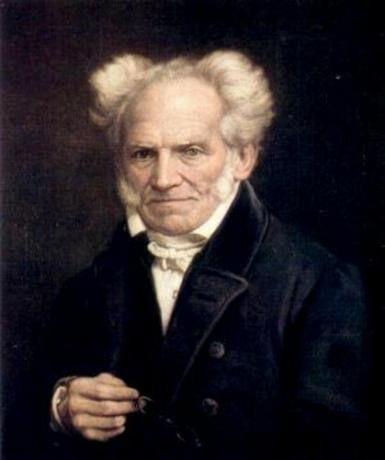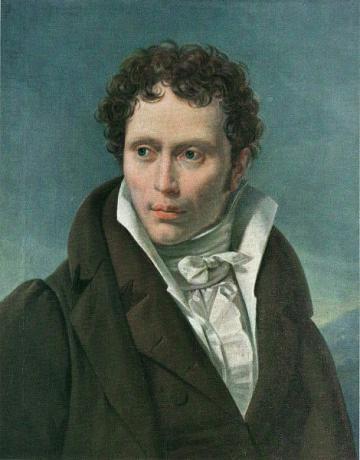Arthur Schopenhauer criticized the explanations rationalists about the foundation of reality and elaborated a reflection centered on a metaphysical concept he named "will". He bases many aspects of his theory on Immanuel Kant, criticizing it, however, for its proposal of moral foundation. He fervently opposed Georg Wilhelm Hegel, extending his criticism to Friedrich Wilhelm Schelling and Johann Gottlieb Fichte.
Friedrich Nietzsche is certainly one of the philosophers most influenced by his theory, who was influential too and especially in the art world.. We find traces of his perspective on suffering in literature, in the works of Thomas Mann, Leon Tolstoy, and Machado de Assis, to mention just a few. Its influence on Richard Wagner, evident in his opera entitled Tristan and Isolde.

Schopenhauer's Biography
Son of Heinrich Floris Schopenhauer, a wealthy merchant, and Johanna Henriette, Arthur Schopenhauer
born in Danzig (now Gdansk, Poland) in February 1788. The division of the country, in 1793, causes the family to move to Hamburg (Germany). Heinrich decides to start educating his son and sends him to France, where he is welcomed into the Gregories' home.He learns the language of that country in a few months and begins to demonstrate his aptitude for studying. In 1799, he was sent to the prestigious Runge Institute, destined for future merchants, where he remained for four years. After an insistence by the young man to attend the gymnasium and thus be able to study at the university, Heinrich Schopenhauer proposed to him a choice: take a long trip with the family, with the promise of becoming a tradesman later, or stay and pursue your ambition academic.
So the family spends two years visiting many countries and returns in mid-1804. This trip, however, only sharpens Arthur Schopenhauer's reflection, which notices the naturally beautiful aspects of places in their social conditions.
After his father's death in April 1805, his mother decides to move to Weimar city, with her younger sister, Luise Adelaide, where she establishes contact with several German intellectuals, including the great poet Johann Wolfgang von Goethe. Arthur Schopenhauer, on the other hand, keeps his promise to his father for another two years, until his mother, in a answering one of his letters, encourages him to seek happiness and advises him to make a decision about his future.

He then decides to resume his studies, learning Spanish and Italian at the same time, and then enters the University of Gotinga in 1809. Initially chooses the Medicine course, but soon after switch to Philosophy. His records indicate that he studied many disciplines with varied subjects, such as: psychology, poetry, zoology and history. It is introduced to the thinking of Plato and Immanuel Kant, as well as reading many classics.
Eager to study with Johann Gottlieb Fichte, he continues his training at the University of Berlin. It is in 1813 that acquires the title of doctor and moves to Dresden the following year, where he begins to write his great work The world as will and representation (1818), reprinted twice (1844 and 1859). The work was not well received and many criticisms were made of his proposals. Part of the first edition was even used as wrapping paper, and the second edition did not find many readers either.
Try the teaching career in 1820, at the University of Berlin, but, even though he was admitted, his attempt to compete with Georg Wilhelm Hegel made him give up on it, as he was unable to get enrollment in his discipline. In the years that followed, he offered translations, but got nothing significant.
With the cholera epidemic of 1831, an event that fatally victimized Georg Wilhelm Hegel, the thinker leaves the capital, Berlin, and fixed residence in Frankfurt. From 1836 onwards, he devoted himself to reading and writing regularly, determined to gain popularity. There is a brief achievement in 1839, when he is awarded by the Norwegian Academy of Sciences for a dissertation.
O awaited recognition, however, only occurs with the publication of Parerga and paralipomena (1851). This collection of brief reflections on a variety of topics is intended for the general public, and the philosopher wanted it to be published before his death. With little sale of the previous great work, few were willing to publish the book.
In correspondence with Julius Frauenstädt, he presents the problem and regrets it by comparing himself with a dancer who was receiving offers to publish her memoirs and was gaining prominence in the newspapers. It is the intervention of this admirer that solves the problem and sends the book for publication.
It starts to be visited by many admirers, intellectuals and artists, and your books and thoughts are highlighted in magazines from around the world. A course opens in Leipzig to study his philosophy, and his bust is modeled by artist Elisabet Ney.
In 1860, he begins to experience rapid heartbeats and breathing problems. On September 21, he is found in his apartment, lifeless.. With his mother and sister now deceased, he had left in his will amounts to a fund destined for the Prussian soldiers who had fought in 1848-1849.
Read more: Contemporary philosophy: period in which Schopenhauer is inserted
Schopenhauer's Philosophy
Arthur Schopenhauer's philosophy isinfluenced byImmanuel Kant, but without imposing reason. By it it is understood that what we know of the world is presented to us by the senses and is subjectively organized. Reason only forms abstract ideas with empirical data. It is the intelligence, present in all living beings, that identifies an external cause for these impressions, but which is inaccessible to us.
Therefore, we only have representations of the world. This would make the world an impenetrable fortress that prevents us from knowing it as it really is. Arthur Schopenhauer proposes, then, that we do not deny an immediate path opened through our voluntary acts. Through our bodies, we are at the same time a represented object and a will that becomes objective in actions.
In human beings, there are no cause-and-effect reactions, as in nature, the will manifests itself directly and is known. What happens to my body can be attributed to other human beings, all animals and nature in a sense. The will manifests itself in a specific way in human beings, but every phenomenon would be the expression of a will. The word "will", thus, it makes no reference to a conscious act and distances itself from our common usage; indicates, rather, a power or impulse of beings for life, a will to life (Wille zum Leben, in German).
It is clear that Arthur Schopenhauer does not subscribe to the philosophical conception in force at his time, namely, the enlightenment, in his assertion that this power is not rationally understood. It is a constant and purposeless impulse, not giving the intimate reality of things a meaning to be understood. That pessimistic metaphysical finding will have design implications moral of that philosopher.
His moral reflections are based on a criticism of Immanuel Kant's ethical perspective. According to this criticism, instead of assuming a principle a priori, we should undertake an empirical investigation and try to find actions with unquestionable moral value. Actions are manifestations of invariant internal provisions, interest is the basic explanation of any of our actions, which would explain the selfish motivations. In any case, we find actions that are not based on an interest, identified with compassion. Moral actions, thus, are always related to the other.
These actions, however, are not expressions of a want, but of the denial of the will. It is the moment when the illusion of phenomena is understood and the other is recognized as a similar. This process is identified by the philosopher himself as mysterious, in view of the selfishness observed in human actions, and its explanation would represent a limit that human knowledge does not reach.
Schopenhauer's Main Works
The philosopher begins his great work, The world as will and representation, with a statement that he adopts as true: "the world is my representation". Although this truth is valid for any being, only the human being can become aware of it. Arthur Schopenhauer advised, in the preface to the first edition of his great work, that the book be read twice. The first of them should be carried out with patience and the second, already with the negative experience of acceptance, would indicate that the work is handed over to humanity, not to its contemporaries.
The central thought was not changed, with the new editions consisting only of corrections and textual additions to the four books that made up the initial edition. Although reading requires prior knowledge of Immanuel Kant's epistemological theory, an indication of the author himself, the language is accessible and the text contains many analogies and examples.
The various texts of Parerga and paralipomena (1851) were published in Brazil in books organized thematically, such as Aphorisms for the wisdom of life (2002), the art of writing (2005), about ethics (2012) and others. Some of his lectures were also published, such as metaphysics of the beautiful (2003), in which it presents a more didactic study on the essence of beauty.
Know more: Empiricism: current that considered experience a source of philosophical knowledge
Schopenhauer's Top Quotes
about ethics
"Like anyone, even the greatest genius is decidedly limited in some sphere of knowledge whatsoever and thus reveals his kinship with the essentially mistaken and absurd human species; likewise, each morally possesses something entirely bad in him, and even the best and even noblest character will occasionally surprise us with particular traits of malignity, likewise, to recognize its kinship with the human species in which every degree of indignity occurs, and even of cruelty."|1|
On the foundation of morals
"Every good action that is totally pure, every truly disinterested help, which, as such, is solely due to the need from another, it is, when researched to the last foundation, a mysterious action, a practical mystique, provided that it arises, in the end, from the same knowledge that constitutes the essence of all mysticism itself and cannot be explained with the truth of any other manner." |2|
Aphorisms for the wisdom of life
"Only the present is true and real; it is time really filled and it is in it that our existence rests exclusively. In this way, we should always offer him a jovial welcome and consciously enjoy every bearable hour free from setbacks or pains, that is, not clouding her with sullen faces about past hopes or anxieties for the future." |3|
the art of writing
“The presence of a thought is like the presence of someone who loves. We think that we will never forget that thought and that we will never be indifferent to our beloved. But out of sight, out of mind! The most beautiful thought is in danger of being irretrievably forgotten when it is not written, just as the beloved can abandon us if we do not marry her.”|4|
Grades
|1| SCHOPENHAUER, Arthur. About Ethics. Organization and translation of Flamarion C. Branches. São Paulo: HEDRA, 2012a.
|2|_____. On the foundation of morals, 2nd ed. Translated by Maria Lúcia Cacciola. São Paulo: Martins Fontes, 2001.
|3|_____. Aphorisms for the Wisdom of Life. Translation, preface and notes by Jair Barboza. São Paulo: Martins Fontes, 2002.
|4|_____. the art of writing. Organization, translation, preface and notes by Pedro Süssekind. Porto Alegre: L&PM Pocket, 2005.
By Dr. Marco Oliveira
Philosophy teacher
Source: Brazil School - https://brasilescola.uol.com.br/filosofia/arthur-schopenhauer.htm
